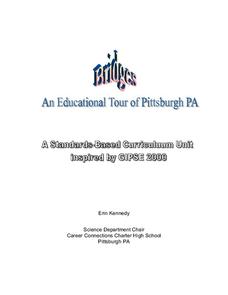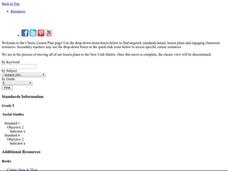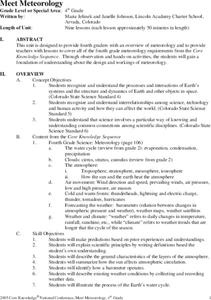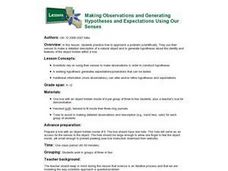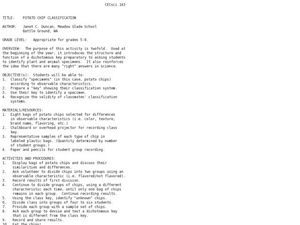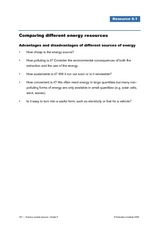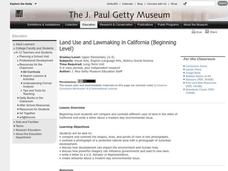Curated OER
Bridges
Students are introduced to the different types, designs and nature of bridges. They observe a historical look at the bridges in and around the Pittsburgh area through a video presentation. Connections are made between science and...
Alabama Learning Exchange
Scrapping the Biomes
Fifth graders investigate biomes of the earth. In this biomes lesson, 5th graders explore eight different biomes which include the tropical rain forest, deciduous forest, grasslands, and taiga. They design an artistic scrapbook that...
Curated OER
Living and Nonliving Things
Students photograph five objects from a bag and five objects from the outdoors. Students categorize things by living and non-living and by properties such as color, size, structure and needs. Students draw conclusions about the basic...
Curated OER
A Day Without Agriculture
Second graders define and create a list of agricultural products. In this producers and consumers lesson plan, 2nd graders participate in a contest to find as many types of agriculture as they can. The student who comes up...
Curated OER
Sunlight and Warm Air
Young scholars examine the different ways heat can be felt. In this radiation and conduction instructional activity, students recognize that the sun radiates heat. Young scholars conduct three experiments to find how the sun warms...
Curated OER
King Cotton
Fifth graders explore the cotton plant. In this cotton lesson, 5th graders research the process of growing cotton. Students explore the economic and cultural differences in the states that grew cotton for trade and industry.
Curated OER
Speedy Trials
Fifth graders investigate how forces affect the motion of an object. In this physics lesson, 5th graders calculate an object's speed using a mathematical formula. They discuss how force and mass affects the speed.
Curated OER
Meet Meteorology
Students explore meteorology, discuss Earth's atmosphere, create drawings of the water cycle, create meteorology journals, and role play forecasters. Nine lessons on one page; includes unit test.
Curated OER
DNA Extraction
Students extract and observe a visible amount of DNA from Escherichia. coli cells. They discuss the properties of DNA. Confirmation of the presence of DNA by a reaction with an indicator is confirmed within this lesson. Many hands-on...
Curated OER
Composting Conundrum
Young scholars research cafeteria composting. In this composting lesson, students design a vessel that would allow the cafeteria staff to collect food scraps for composting. Then young scholars build a prototype and present it to the...
Curated OER
Comparison of Normal vs Mutant Zebra Fish Embryos
Young scholars observe and study mutations. In this mutations lesson, students work in groups to complete observation tables of various mutations of the zebra fish embryos. Groups give presentations about their observations.
Curated OER
Where are all the Animals?
Students view animals that camouflage at the Shedd aquarium website. In this camouflage lesson, students recognize that there are different types of camouflage, cryptic coloring, counter-shading, warning coloration and mimicry. Students...
Curated OER
Marine Protected Areas (MPA)
Ninth graders explain the purpose of MPA's. In this biology lesson, 9th graders identify MPA's in Southern California. They simulate coastal sampling using candy from two buckets. Students analyze their results and share it with the class.
Curated OER
Simple Harmonic Motion with Dr. DAQ
Students study the work and accomplishment of Galileo. In this physics lesson, students calculate the period of a pendulum's using a mathematical equation. They explain the different factors affecting its period.
Curated OER
Making Observations and Generating Hypotheses
Learners practice how to approach a problem scientifically. They use their senses to make a detailed description of a natural object and to generate hypotheses about the identity and features of the object hidden within a box.
Curated OER
Problem Solving: Dots, Symbols, Words and Proteins
Students use symbols and dots to investigate the amino acids in a protein. In this problem solving lesson plan, students use dots and symbolic analogies to solve problems using the IDEAL problem solving method which includes identifying...
Curated OER
Potato chip Classification
Students create a dichotomous key using potato chips. In this classification lesson plan, students sort potato chips into groups based on observable characteristics. They record their results to create a dichotomous key in preparation...
Curated OER
Life Cycle- The Human Body
Seventh graders examine the life cycle of the human. In this human life cycle instructional activity, 7th graders discuss the many different stages of the human life cycle. Students use pictures from magazines to create a representation...
Curated OER
Traveling the Planets!
Fourth graders research the planets and create brochures to share their information. In this planets lesson, 4th graders navigate the Internet to gather information for a brochure about an imaginary trip to their planet....
Curated OER
Surviving the Conditions
Students explore Earth science by participating in an environmental care activity. In this natural resources lesson, students discuss ways to protect themselves from the environment if they are ever in need of shelter in the wilderness....
Curated OER
Comparing Different Energy Resources
Young scholars examine the advantages and disadvantages of the different sources of energy. In this energy lesson students complete an experiment and worksheet.
Curated OER
It's The States of Matter
Students investigate the properties of solids, liquids and gases. For this states of matter lesson plan, students observe dry ice and its characteristics. They calculate the density of dry ice and observe the sublimation of the dry ice...
Curated OER
Land Use and Lawmaking in California
Students investigate the laws of using land. In this California Government lesson, students examine the many uses of land in California and find an environmental issue they care about. Students write a letter to a politician...
Curated OER
Worms: Nature's Recyclers
Students explore vermi-composting. In this vermi-composting lesson, students listen to the story Diary of a Worm and discuss the parts of a worm. They create worm bins and add organic food for the worms to recycle.
